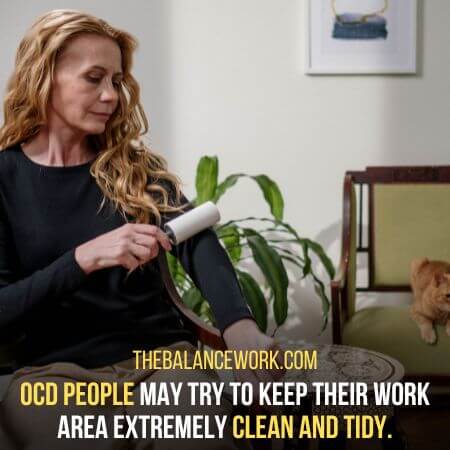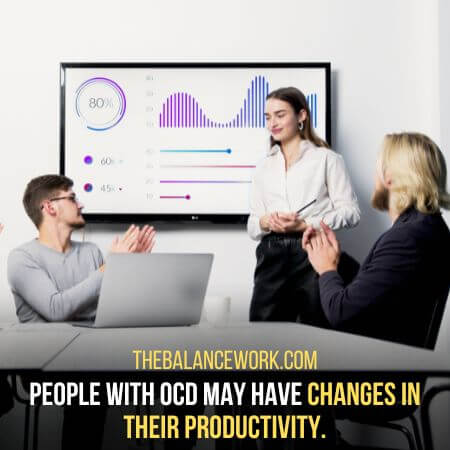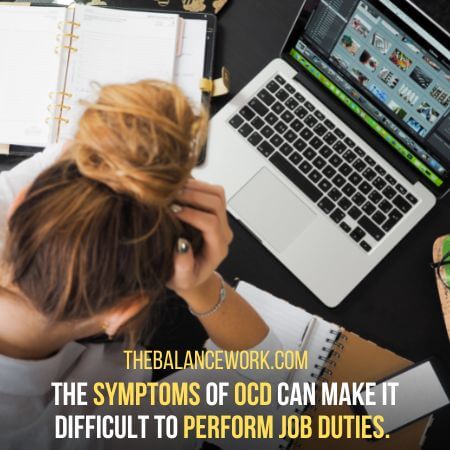If you have never had to before, it is difficult to understand how to deal with OCD coworker. They are compulsive, but you don’t have to be. Here’s how:
OCD people may seem overly critical or perfectionistic and can be frustrating.
9 Ways To Deal With OCD Coworker
If you have an OCD coworker, here are some tips on how to deal with them:
1. Be Understanding:
The first step is to try to be understanding. It can be challenging to work with someone with OCD.
However, it is essential to remember that they cannot help it.

If you are understanding, it will make your coworker feel comfortable and appreciated.
To be understanding, you can:
– Listen to your coworker when they talk about their OCD.
– Try to be patient if they take longer to complete tasks or are extra meticulous about their work.
– Avoid judging them or making them feel bad about their disorder.
Let’s discuss these aspects in detail below.
2. Listen To Your Coworker:
When your OCD coworker talks about their disorder, it is crucial to listen to them.
This will show that you are interested and want to understand more about what they are going through.
It can also be helpful to ask questions about their experiences.
This will help you better understand their condition and how it affects them.
For instance:
– What are some of the things that trigger your OCD?
– How does your OCD make you feel?
– What are some things you do to cope with your OCD?
3. Be Patient:
As we mentioned, people with OCD can be extra meticulous about their work.
They may take longer to complete tasks or seem like they are never satisfied with their work.
It is essential to be patient with your OCD coworker. Remember that they cannot help it and are just trying to do their best.
If you tend to lose your patience, it may be helpful to take a step back and take a few deep breaths.
This will help you stay calm and avoid saying or doing anything that you may regret.
For instance:
– Avoid rushing them or telling them to hurry up.
– Avoid getting frustrated if they make mistakes. Or if they are not working as fast as you would like.
– Refrain from telling them just to relax or that they are overreacting.
4. Avoid Judging Them:
It is important to avoid judging your OCD coworker.
This includes making comments about their disorder or the way they do things.
Judging them will only make them feel bad. It could make them feel like they have to hide their condition from you.
If you judge your coworker, try to remember that they cannot help it. Moreover, they are just like anyone else.
For instance:
You think, “Why can’t they just relax?” or “They’re being so ridiculous.”
Stop and remind yourself that your coworker cannot help their OCD.
5. Offer Help And Support:
You can offer help and support to your OCD coworker if you want to.
This could include helping them with their work. Also, you can offer to talk to them about their experiences.
However, it is important only to offer help if comfortable doing so. Do not feel like you have to help them if you do not want to.
Moreover, only offer help if you are sure they would appreciate it.

Some people with OCD may not want others to know about their disorder.
They may not be comfortable talking about it or accepting help from others.
If you are unsure whether or not your coworker would want help, you can always ask them.
6. Avoid Making Them Feel Uncomfortable:
You should avoid doing certain things if you have an OCD coworker.
This includes making them feel uncomfortable or triggering their OCD.
For instance, you should avoid:
– Asking them personal questions about their disorder.
– Making comments about the things they do to cope with their OCD.
– Talking about topics that may trigger their OCD.
– Making fun of them or their disorder.
This way, you can avoid making your coworker feel uncomfortable. Instead, help them to feel more comfortable around you.
7. Be Respectful:
It is essential to be respectful towards your OCD coworker.
This includes respecting their privacy. Also, appreciate the way they choose to cope with their disorder.
You should avoid making them feel like they have to justify their actions or choices.
Instead, try to be understanding and supportive.
For instance:
– Avoid asking them why they do certain things or why they cannot just relax.
– Do not tell them that their OCD is not a big deal or that they are overreacting.
– Do not try to tell them how to cope with their disorder.
8. Seek Help If Needed:
If you struggle to deal with your OCD coworker, it is essential to seek help.
There are many resources available to help you. These include books, articles, support groups, and therapy.
If you feel overwhelmed, you can talk to your supervisor or HR department. They may be able to provide you with additional support or resources.
In the end, it is essential to remember that you are not alone. Many people deal with OCD in the workplace.
9. Educate Your Staff:
It is essential to educate your staff about OCD if you are a manager.
This way, they will be more understanding and supportive of your OCD coworker.
It is also essential to create an inclusive environment in the workplace. This can help your OCD coworker feel more comfortable and accepted.

Some tips for creating an inclusive environment include:
– Displaying posters or information about OCD in the workplace.
– Encouraging employees to ask questions about OCD.
– Creating an OCD support group or network.
– Offering training on how to deal with OCD in the workplace.
By following these tips, you can make the situation easier for you and your coworker.
What Are Signs Of OCD In The Workplace?
Several signs may indicate that someone has OCD in the workplace. These include:
1. Excessive Hand-washing Or Sanitizing:
This may signify that someone is trying to reduce their exposure to germs.
OCD can cause people to obsess over being contaminated by germs.
They may wash their hands excessively or use hand sanitizer frequently.
2. Avoiding Touch:
This may signify that someone is trying to avoid contact with contaminants.
OCD can cause people to believe that they will become contaminated if they contact particular objects or surfaces.
They may avoid touching door handles, shaking hands, or using public restrooms.
3. Constantly Checking:
They might think someone is trying to reduce their risk of making mistakes.
They worry that they will make a mistake that will have serious consequences.
As a result, they may check their work frequently or ask others to check it for them.
4. Excessive Tidiness Or Cleanliness:
OCD people may try to keep their work area extremely clean and tidy.
It is because they worry that dirt and germs will contaminate their work.

They may also avoid eating at their desk or using common areas.
5. Perfectionism:
They may have high standards for their work and strive for perfection.
As a result, they may spend excessive time on their work. They also may be unwilling to delegate tasks.
6. Difficulty Concentrating:
OCD can cause people to have intrusive thoughts. They make it difficult to concentrate.
These thoughts may be about contamination, making mistakes, or other fears.
As a result, people with OCD may have difficulty completing tasks.
7. Needing Things To Be “Just Right”:
They try to reduce their anxiety by ensuring everything is “just right.”
This may involve organizing their work area in a certain way or completing tasks in a specific order.
8. Excessive Worry:
People with OCD may constantly worry about work-related issues.
They may worry about making mistakes, being contaminated, or not meeting deadlines.
This can lead to sleep problems, fatigue, and difficulty concentrating.
9. Mood Swings:
OCD can cause people to have mood swings.
They may be cheerful one minute and then suddenly become irritable or anxious. This can make it difficult to interact with coworkers.
10. Isolation:
People with OCD may start to isolate themselves from others.
They may avoid socializing or participating in work-related activities. This can make it challenging to maintain relationships with coworkers.
11. Changes In Productivity:
People with OCD may have changes in their productivity.
They may be able to work for long periods without taking a break. Or they may have difficulty completing tasks.

It can be hard to predict how much work they will get done in a day.
If you notice any of these signs in a coworker, they may have OCD.
It is essential to be understanding and supportive if you think someone you work with has OCD.
Why Is OCD A Problem In The Workplace?
OCD can be a problem in the workplace for several reasons.
1. OCD Can Interfere With Productivity:
The obsessions and compulsions associated with OCD can take up a lot of time.
This can make it difficult for people with OCD to complete tasks or meet deadlines.
Thus, OCD can interfere with productivity and job performance.
2. OCD Can Cause Conflict With Coworkers:
The symptoms of OCD can cause conflict with coworkers.
For example, someone with OCD may avoid shaking hands with others. This can make it challenging to build relationships with coworkers.
Thus, OCD can cause conflict with coworkers and lead to isolation. They may avoid socializing or participating in work-related activities.
3. OCD May Lead To Job Loss:
The symptoms of OCD can make it difficult to perform specific job duties.
For example, someone with OCD may have difficulty using a computer. They are afraid of contamination.

This can make it difficult to perform specific job duties. As a result, OCD may lead to job loss.
4. OCD May Impact Work-Life Balance:
The symptoms of OCD can impact work-life balance. For example, someone with OCD may spend a lot of time on their work.
As a result, they may have less time for other activities. Therefore they may have difficulty maintaining a work-life balance.
5. OCD Can Cause Stress:
The symptoms of OCD can cause stress. For example, someone with OCD may worry about making mistakes at work.
This can lead to anxiety and sleep problems. Moreover, the symptoms of OCD can be overwhelming. This can lead to burnout.
Conclusion:
To deal with an OCD coworker, it is essential to be understanding and supportive.
It is also essential to be aware of the signs of OCD. And how it can impact a person’s work life.
If you think your coworker has OCD, you can offer to help them find resources or treatment options.
You can also talk to your HR department about how to best support your coworker.
OCD can be a problem in the workplace for several reasons. The obsessions and compulsions associated with OCD can take up a lot of time.
This can make it difficult for people with OCD to complete tasks or meet deadlines.
The symptoms of OCD can cause conflict with coworkers and lead to isolation.
Last Updated on 6 hours by Shahzaib Arshad
- Why Does My Boss Wink At Me? 6 Potential Reasons - October 5, 2023
- Is It Legal For Your Employer To Call Your Doctor? No, But… - October 4, 2023
- 12 Ways To Deal With A Low IQ Person - September 22, 2023